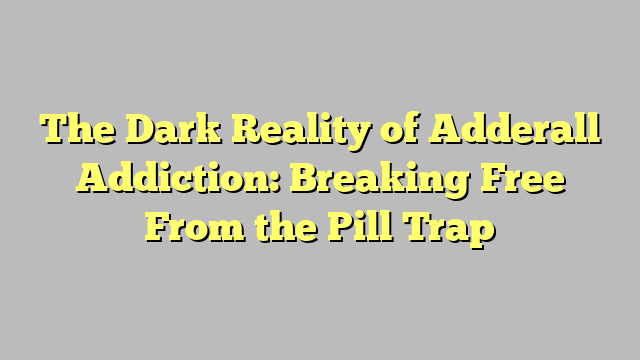
The Dark Reality of Adderall Addiction: Breaking Free From the Pill Trap
- by Jose Bryant
Adderall addiction is a silent but growing epidemic, trapping individuals in a cycle of dependence that can have far-reaching consequences. What may start as a seemingly helpful aid for focus and productivity can quickly spiral into a full-blown addiction, consuming every aspect of a person’s life. The allure of increased energy, enhanced performance, and heightened concentration can mask the dark reality lurking beneath the surface, leading individuals down a dangerous path of misuse and dependency.
Is Adderall Addictive
Understanding Adderall Addiction
Adderall addiction can begin innocently enough, often stemming from a legitimate medical need for the medication due to conditions like Attention Deficit Hyperactivity Disorder (ADHD). The drug’s ability to enhance focus and increase energy levels can be enticing, leading individuals to rely on it for academic or work performance.
However, what starts as a helpful tool can quickly spiral into a dependency as the brain adjusts to the presence of Adderall. The feelings of increased productivity and alertness can become intertwined with one’s sense of self-worth, making it difficult to imagine functioning without the drug. This psychological reliance can pave the way for addiction to take hold.
As tolerance builds, individuals may find themselves needing higher doses of Adderall to achieve the same effects. This cycle of escalating usage can lead to physical and mental health issues, as well as social and legal consequences. Breaking free from Adderall addiction requires a multifaceted approach that addresses both the physical and psychological aspects of dependency.
Consequences of Adderall Dependence
Adderall addiction can lead to severe repercussions on both physical and mental health. Prolonged abuse of Adderall can cause cardiovascular issues, such as high blood pressure and irregular heart rhythm, putting individuals at risk of heart attacks and strokes.
Additionally, those dependent on Adderall may experience detrimental effects on their mental well-being. Increased anxiety, paranoia, and even hallucinations are common among individuals struggling with addiction to this stimulant medication. These can have a profound impact on one’s quality of life and relationships.
Moreover, the academic or work performance of those hooked on Adderall may decline over time. Dependency on the drug can result in a vicious cycle of needing it to focus, leading to decreased productivity and potential job loss or academic failure.
Overcoming Adderall Addiction
Recovery from adderall addiction is a challenging journey that requires determination and support from loved ones. It is essential to seek professional help and guidance throughout the process. Therapy sessions and counseling can help address the underlying reasons for addiction and provide coping mechanisms to overcome cravings.
Building a strong support system of friends and family members who understand and encourage your recovery is crucial. Surrounding yourself with positive influences and engaging in healthy activities can help distract you from the urge to use Adderall. Expressing your feelings and struggles openly with trusted individuals can also provide emotional relief during this challenging time.
Adopting a healthy lifestyle, including regular exercise, proper nutrition, and sufficient sleep, is essential for recovering from Adderall addiction. Developing new habits and routines can help fill the void left by the absence of the drug. Remember, recovery is a gradual process, and it is okay to seek help and take things one step at a time.
Adderall addiction is a silent but growing epidemic, trapping individuals in a cycle of dependence that can have far-reaching consequences. What may start as a seemingly helpful aid for focus and productivity can quickly spiral into a full-blown addiction, consuming every aspect of a person’s life. The allure of increased energy, enhanced performance, and heightened…